Biden wins: What's next for China-US relations?
By GT staff reporters Source: Global Times Published: 2020/11/8 3:50:36 Last Updated: 2020/11/8 20:50:36
Moderate and mature foreign policies under Biden lead to adjustment, no significant change in overall containment of China: experts
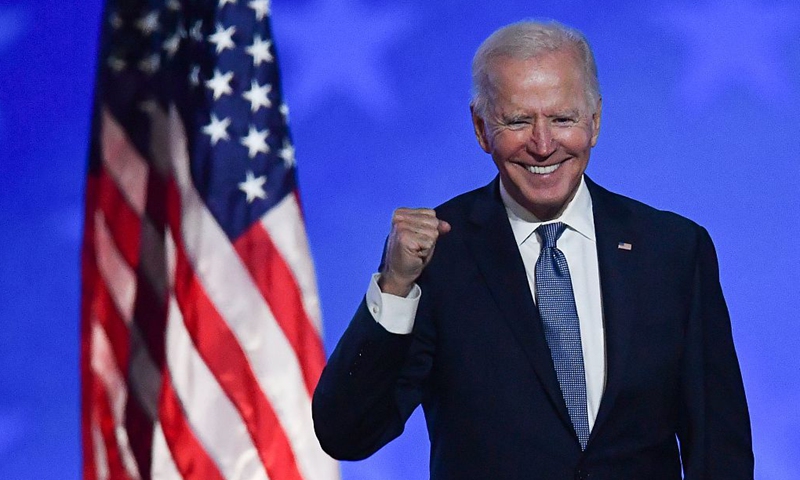
Photo: VCG
As a crucial victory in major swing state Pennsylvania put Joe Biden over the 270 Electoral College vote threshold to win the presidency, the president-elect made his first speech on Saturday night emphasizing "unity and healing." While the world displays a growing sense of expectation for the 46th president of the US, some Chinese experts considered the outcome offers some "breathing room" for the tense China-US relations.
Biden entering the White House is expected to provide an opportunity for breakthroughs in resuming high-level communication and rebuilding mutual strategic trust between the two major countries, some experts forecast.
Biden won the presidency and delivered a speech on Saturday, promising to "restore political normalcy and a spirit of national unity to confront raging health and economic crises," according to The New York Times. The victory also signals a repudiation of incumbent US President Donald Trump's "divisive conduct and chaotic administration," the newspaper said.
While the US is about to welcome its new president, some Chinese academics and observers on China-US relations have been keeping a close eye on the outcome of the race, which may also bring changes to deteriorating bilateral relations that have been trapped in a vicious circle under the Trump administration.
Jin Canrong, associate dean of the School of International Studies at the Renmin University of China in Beijing, told the Global Times that Biden will usher in a "buffer period" for China-US relations - relations may still worsen, but not as quickly.
"Biden will be more moderate and mature in handling foreign affairs," Jin said.
Biden is expected to appoint more professional officials to his diplomatic team and so it will be possible for US-China tensions to take a brief timeout.
The vicious circle has led to damaged strategic mutual trust, a suspension of high-level communication and little concrete cooperation, Xin Qiang, deputy director of the Center for US Studies at Fudan University, told the Global Times.
It might now be expected that China and the US will resume pragmatic cooperation on vaccines, the anti-epidemic fight and climate change, Xin noted. Some liaison mechanisms and stalled dialogues can be expected to resume, "but it will take time to rebuild mutual strategic trust," he said.
However, the pending change in US leadership will not change the overall direction of Washington's China policy, observers said. Regardless of who resides in the White House, the US will to some extent maintain its current approach toward China.
Biden's China policy will not simply return to the Obama-era approach, since during the past four years China-US relations and the global landscape have changed significantly, observers said.
"We should not put too much expectation on Biden," Jin said, "because to contain and confront China is a strategic consensus between the two parties of the US."
Biden might take different measures but not a different overall direction, Jin asserted.
The elites and the public in both countries have reshaped their perspective on each other's country, Da Wei, director of the Center for Strategic and International Security Studies of the University of International Relations in Beijing, told the Global Times.
"Biden's China policy will be built upon the Trump era. In fact, a fundamental change in China policy is probably the major political legacy left over from the Trump administration," Da said.
There is some bipartisan consensus in the US that its policy of engagement with China needs an overhaul and that will not change as Biden takes office, Da warned.
The question of what alternatives he will pursue remains unclear, Da noted. "However, competition does not mean decoupling," Da said. "I don't think the incoming Biden administration will agree on a full-scale decoupling with China."
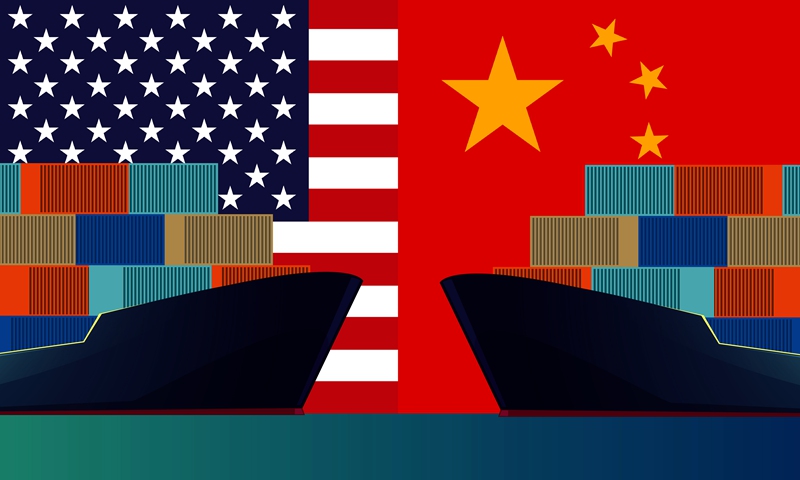
China US Photo:Global Times
Will the trade war continue? Will punitive tariffs be scrapped?
An October report by Swiss bank Lombard Odier noted that a Biden win "reduces some trading uncertainty," according to CNBC.
A Biden presidency could lead to a more rational approach to bilateral trade even if his team could prove as hawkish on China as Trump's, the bank's analyst was quoted as saying in the US media report.
But a Biden presidency should automatically spell a rapid reduction in tariffs on Chinese goods, the report speculated.
Xin of Fudan University predicted that the two governments may first reassess the phase one of the US-China trade agreement.
It cannot be ruled out that some adjustments will be made due to the changing situation and then the two sides can continue negotiations on the basis of the phase one agreement.
"From the perspective of the US, the tariffs imposed by Trump are actually a good bargaining chip for Biden to continue negotiations, and he is unlikely to take the initiative to cancel them," Xin said.
Democratic-supporting labor groups have always leaned toward protectionism compared to the Republican Party, the expert said.
Trump's position on trade issues is not necessarily a mainstream GOP view. Thus in those areas where the American people are been hurt from trade frictions, such as daily necessities, the tariffs against China may be relaxed, but in other areas, long-term difficult negotiations may be required.
Biden will immediately consult with the US' main allies before deciding on the future of US tariffs on China, seeking "collective leverage" to strengthen his hand against Beijing if elected president, Reuters reported in October, citing Biden top advisers.
The two Biden aides said the starting point would be to not repeat the mistakes of Trump when he slapped tariffs on European and Canadian goods as part of his "America First" agenda, antagonizing key US partners, according to the report.
Biden's victory has revived the proposition of the Trans-Pacific Partnership Trade Agreement (TPP) introduced during the Obama administration. The agreement was never approved by a Republican-dominated US Congress, but was generally believed to be aimed at pressuring China.
After officially taking office in 2017, the first thing Trump did was to announce the US' withdrawal from the TPP, but the remaining 11 countries of the pact went on to sign the Comprehensive Trans-Pacific Partnership Agreement (CPTPP) in March 2018.
Da believed it was possible, but difficult, for the US to rejoin the agreement.
Joining the CPTPP may face opposition from both parties in Congress, as signing up a free trade arrangement is increasingly politically incorrect in American society, Da said.
"Returning to the CPTPP also requires negotiations with existing member states, which technically takes time," he said.
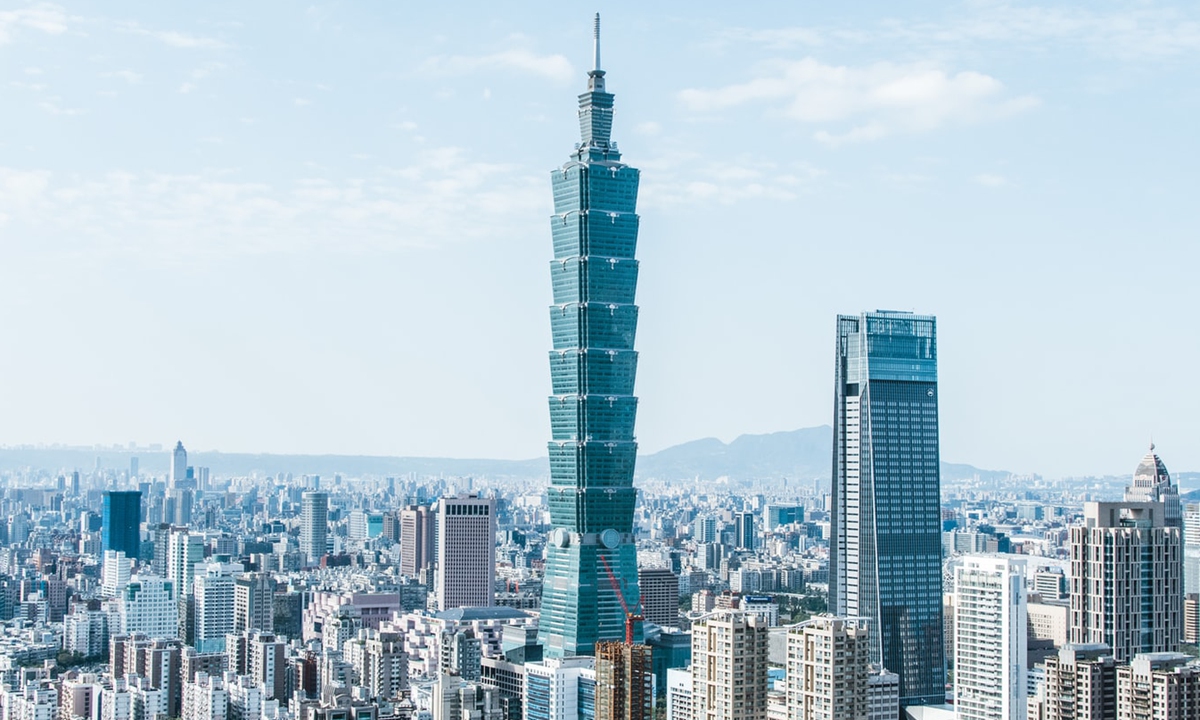
Taiwan Photo: Unsplash
Is risk rising or falling of a China-US clash in the Taiwan Straits?
Sun Taiyi, an assistant professor of political science at Christopher Newport University in Virginia, the US, told the Global Times that both Democrats and Republicans want to improve ties with Taiwan, a position shared by the White House and both houses of the US Congress.
Biden foreign policy adviser Anthony Blinken, a strong contender for secretary of state in the future administration, told media in May that he would adopt a "balanced strategy" to handle cross-Straits relations.
Such a strategy would not be as "pro-Taiwan" as Trump, but would help create a more secure and stable environment across the Straits, he said.
The US would not try to provoke China by crossing a "red line," which in turn would reduce the possibility of a Beijing military strike on Taiwan, Blinken noted.
"The good thing about Trump's Taiwan policy is that he won't risk a war with the Chinese mainland for Taiwan, but his recklessness and lack of understanding of the sensitivity of the Taiwan question may lead to unexpected risks," Xin said.
Biden should be more cautious and restrained on Taiwan question, Xin believes.
While US efforts to sell arms to Taiwan and support the island will continue, Biden has a clear understanding of the dangers and red lines of the question, which would reduce the chances of a clash across the Taiwan Straits, he said.
Chinese experts predicted that the Biden administration would not go far beyond the traditional US policy on Taiwan and that it is highly unlikely there will be a push for a clear strategy on the island during his tenure.

Hong Kong. Photo: VCG
Will Biden back more sanctions against China over Hong Kong?
The Hong Kong-based South China Morning Post quoted observers as saying that Trump's previous moves to sanction Hong Kong officials and end the region's special trade status are unlikely to be reversed by a Biden administration.
The report said that Biden would likely maintain a tough line on China on technology, economics and other fields, but was unlikely to use Hong Kong issue as a bargaining chip. The Biden administration would prefer to return to traditional US-China competition and diplomacy.
Lau Siu-kai, vice-president of the Chinese Association of Hong Kong and Macao Studies, told the Global Times he did not expect Biden to add to existing Hong Kong sanctions.
"In the US, and China's Hong Kong and Taiwan, there are some anti-China forces, such as Hong Kong separatists and Taiwan's Democratic Progressive Party authority, that bet on Trump and even spread disinformation to attack Biden during the election," Jin told the Global Times.
"This will prompt the Biden administration to reduce support to them, but the new administration won't abandon these forces as they are still useful to the US."
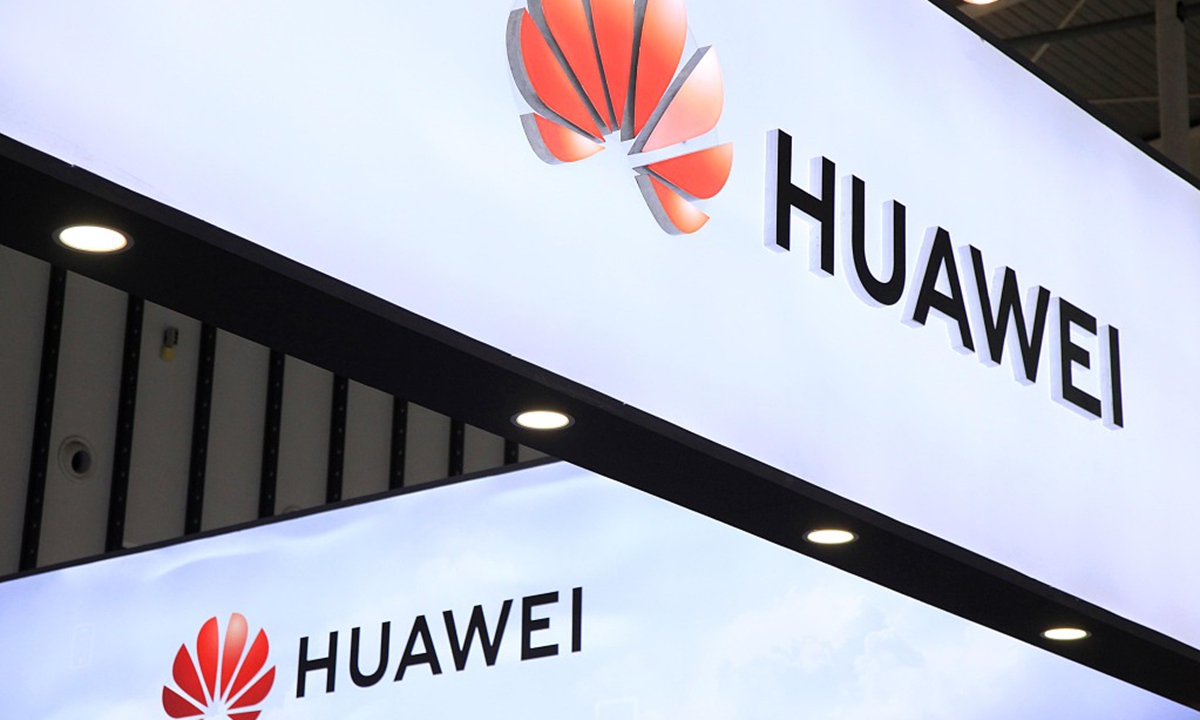
Huawei Photo: CFP
Will sanctions on Chinese tech companies such as Huawei and TikTok be eased or intensified?
An opinion piece published by the India Observer Research Foundation (ORF) on Friday said that if Biden's pre-election political rhetoric translates into post-election action on Chinese technology, the technological decoupling will intensify between the US and China.
Da suggested that after Biden takes office, the US crackdown on China's core technology may not relax, but its scope might narrow.
Trump previously proposed a catch-all scope defined by "national security" and "technological competition" that was unrealistic, Da said.
"For example, for companies like TikTok and WeChat, the ban could be lifted as they do not have irreconcilable conflicts with the US," Da said.
But in areas where Huawei is at the heart of an irreconcilable rivalry between China and the US, the situation is "more complicated," Da said.
"I expect there will be some loosening of chip sales to Huawei by the US, but it will be very difficult to change the policy on 5G construction," he said.
Xin believed Biden would not follow Trump into US-China entanglements over non-critical technology.
The essential difference between Biden and Trump would be in core areas such as aerospace, quantum communication and artificial intelligence, Xin noted.
"It is inevitable that China and the US will partly decouple from each other in the high-tech sector," Xin said.
The victory of Biden, who "represents the pro-establishment camp of the US," would make some forces within China have the illusion of a US policy reversal, Jin said, but China should "keep vigilant and stick to the right path of strengthening self-reliance."
Such forces would "try to argue that China doesn't need to improve its self-reliance capability anymore because Biden will fix US-China relations so China can still import high-tech products from the US," he said.
That is plain wrong, Jin asserted.
"China should not put its destiny in the hands of a change within the US," he said.
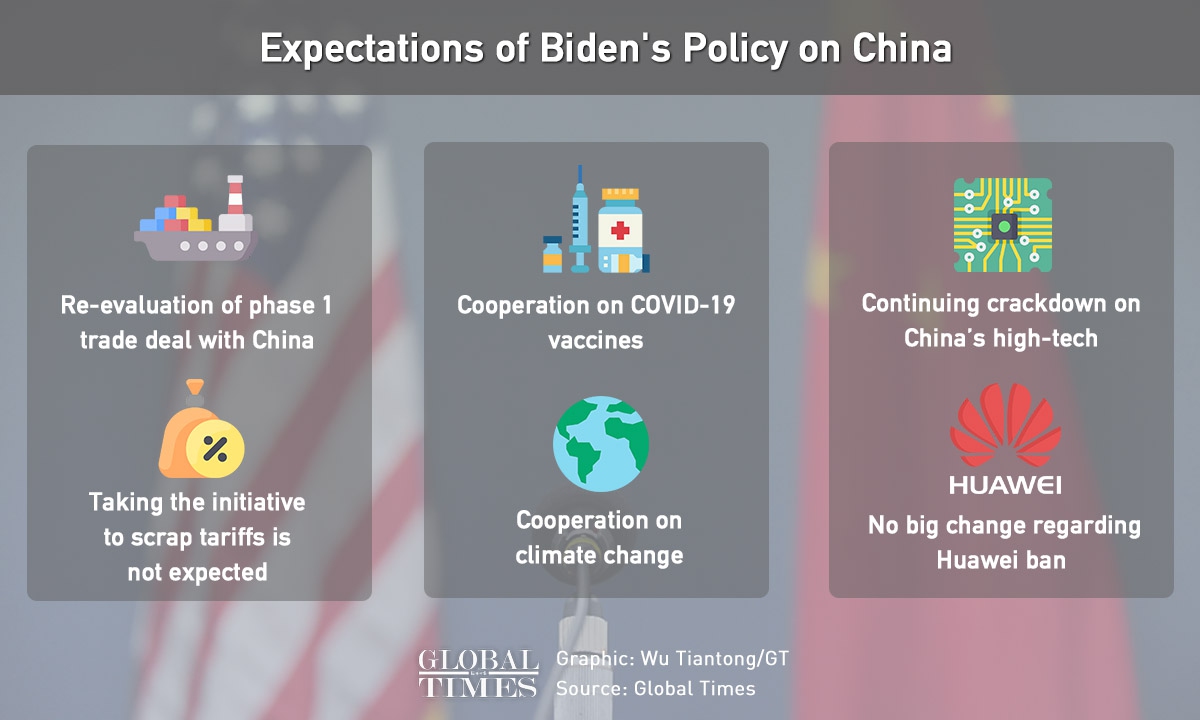
Infographic: GT
Will the US exhibit a 'final madness' in its China policy over the next 70 days?
There are 70 days to go until the inauguration of the new president on January 20. What risks will the China-US relationship face during this period? Chinese analysts posited a possible "final madness" from Trump in his relations with China.
Da said Trump would logically use his last two months in office to solidify the policies of his presidency so that they could not be reversed by the Biden administration, including China policy.
Trump administration officials like US Secretary of State Mike Pompeo would likely use this last chance to undermine US-China relations, he said.
The South China Morning Post reported Saturday that tensions would likely increase between China and the US over Taiwan, the South China Sea and other issues ahead of the inauguration ceremony in January.
The Trump administration might step up efforts to confront China politically, economically and diplomatically. But Trump will reduce the risk of a major crisis if he instead focuses more closely on his domestic electoral battles and legal proceedings.
Shen Yi, an expert on US politics and international relations at Fudan University in Shanghai, told the Global Times that the election shows us that "the pro-establishment forces among both the Democrats and Republicans have united and cooperated to kick Trump out of the office."
So in his last 70 days in the White House, Trump will have no supporters and no resources to be able to take any major action or make a big trouble in international relations and it would be meaningless for him to try to do so, as "no one will listen to his instruction anymore," Shen said.
"Technically, Trump has entered a period of 'being the lame duck'," Shen noted. Some institutions including military departments that have complex structure to execute the orders from Trump need to consider the costs after January 20 from a realistic perspective, so it is highly unlikely that all his orders will be implemented, he added.
With regard to the possibility of surprises in China-US relations during the power transition period, some Chinese analysts shed the light on issues of concern such as the detention of Huawei's senior executive Meng Wanzhou, executive orders to ban TikTok and WeChat and further restrictions on Chinese students in the US.
"The handling of the arrest of Meng, for example, will be a major indicator to assess the future adjustment in China-US relations," Shen said, adding that it is also likely that Trump will issue executive orders to ban Chinese apps in his final days as the top US leader.

Likely and unlikely measures by US president-elect Joe Biden Infographic: GT
Posted in: AMERICAS